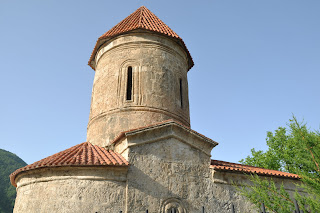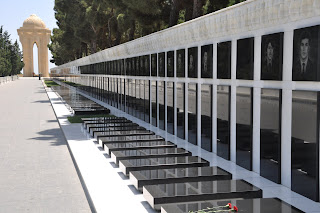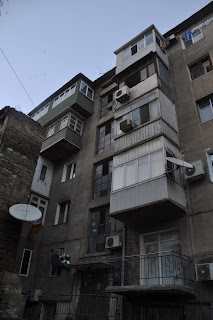So I just arrived back in Baku after a short excursion to Georgia to renew my visa for Azerbaijan. My time there was nice and refreshing, beginning with the two young Georgians I shared a cab with on the train from Baku to Tbilisi. They both spoke very good English, something I find to be quite a rarity in these parts. After getting to know one another, they learned that I did not have a place lined up to stay and no plans on Sunday (as the Embassy does not open till Monday), so they insisted they show me traditional Georgian hospitality. This consisted in taking me out to their family's home in a small village about 25 km outside of Tbilisi, where we enjoyed some Georgian cuisine. From there, my hosts took me to see a beautiful monastery tucked away in the hills outside of the village, where we walked around the 6th century complex surrounded by monks in long robes sporting thick black beards.



After another stop by their home, we headed back to Tbilisi where I spent the night at one of the guys apartment, while he had to go to work that night, as he worked as an air-traffic controller for the military. The next morning was spent doing visa work, with the rest of the day dedicated to exploring Tbilisi. I started with a climb up to some old caste ruins that offer great views over the entire city, as you can see the river running through town with churches and homes perched precariously close to the edge. Tbilisi is a town that feels like it has as many churches (at least per cpaita) as Rome does, but they all normally have quite a dark interior and are stocked to the brim with various icons, a normative part of their Eastern Orthodox worship.



After climbing up to the ruins, I took a walk though the old town, where home sit atop the old city walls, and then down the main avenue, and I must say I was extremely impressed with the city. It was quite beautiful and historic, and the people and culture had much more of a European feel than their neighbors over in Baku. While the city does not have some of the extravagant wealth of Baku, I had the impression that on the whole people lived a bit better. Some of this has to do with the recent crackdown on local corruption, which now does not come close to the levels here in Azerbaijan. The country has, however, suffered somewhat in recent wars with Russia, especially over the controversial region of South Ossetia.


The rest of my time there was spent exploring other parts of the city, and after my visa was approved, I jumped back on a train to Baku, where I tried to get a little sleep despite the fact that my cabin-mate on the train was sawing some serious logs last night. Sorry for being MIA for a bit, but I was out and about, and will probably be doing some more work related travelling at the end of this week.




.JPG)
























